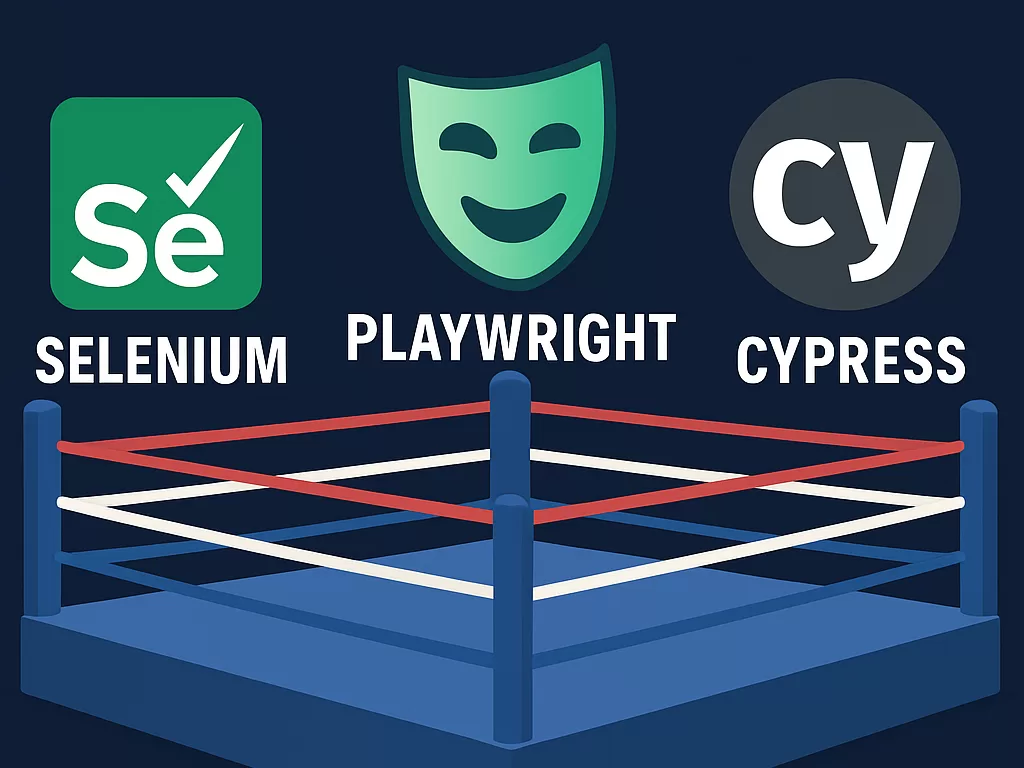In the fiercely competitive world of test automation, three contenders are stepping into the ring: Selenium, Playwright, and Cypress. To find out who truly reigns supreme in 2025, we simulated four real-world testing scenarios — from login flows to CI pipelines — and compared key metrics such as development time, execution duration, flakiness, and maintenance effort.
Evaluation Methodology
- Test Scenarios:
- Login Flow (Simple Authentication)
- Checkout Process (Cart, Simulated Payment)
- Responsive Testing (Mobile vs. Desktop)
- Parallel Execution in CI (Distributed Execution)
- Metrics Collected:
- Script Writing Time
- Suite Execution Duration
- Flakiness Rate (Intermittent Failures)
- Maintenance Effort After Layout Changes
- Ease of Parallel Execution Setup
Results by Scenario
| Tools | Script Writing Time | Suite Duration | Flakiness | Maintenance Time |
|---|---|---|---|---|
| Selenium | 50 minutes | 12 minutes | 15% | 20 minutes |
| Playwright | 35 minutes | 8 minutes | 5% | 10 minutes |
| Cypress | 30 minutes | 6 minutes | 8% | 15 minutes |
Notes:
- Script Writing Time: Average across all four scenarios;
- Flakiness: Percentage of test runs that failed without changes to the test code;
- Maintenance: Average time to adjust test cases after modifying IDs and classes in the HTML.
Strengths and Weaknesses
| Ferramenta | Pros | Coins |
|---|---|---|
| Selenium | – Mature support for multiple browsers via WebDriver – Extensive community and plugins |
– Verbose script writing and maintenance – High flakiness in dynamic layouts – Complex parallel execution setup |
| Playwright | – Multi-engine (Chromium, Firefox, WebKit) with a single script – Advanced debugging (time-travel, screenshots) – Low flakiness and simplified parallel setup |
– Steeper learning curve compared to Cypress – Community still growing |
| Cypress | – Clean, intuitive JavaScript API – Visual Test Runner with real-time replay – Fast front-end test writing |
– Limited engine support (no native WebKit) – Parallel execution and CI integration may require paid plugins at scale |
Who Gets Knocked Out?
- Speed Champion: Cypress, with a full suite completed in just 6 minutes and script writing in 30 minutes.
- Stability Champion: Playwright, with only 5% flakiness and rapid maintenance.
- Falling Behind: Selenium lags in the ring, burdened by higher maintenance and instability.
In terms of overall advantage, Playwright takes the belt as the best balance between speed and reliability, while Cypress remains the top pick for JavaScript-focused front-end teams.
More Than an Alternative – A New Era with TestBooster.ai

While each tool shines in its specialty, none combine natural language testing, contextual understanding, and speed quite like TestBooster.ai. It’s not just a modern alternative — it’s the next generation of intelligent automation, designed to accelerate cycles, reduce rework, and boost confidence in every release.
If your team is still tied to solutions that demand constant maintenance, heavy infrastructure, or manual test writing, TestBooster.ai is the natural step forward toward true automation.






